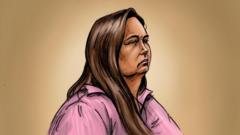In a landmark case, five men have received death sentences for the murder of 67-year-old Dahare Abubakar, who was attacked based on accusations of witchcraft, underscoring the dangers of such claims in rural Nigeria.
Five Men Condemned to Death for Witchcraft Murder in Nigeria

Five Men Condemned to Death for Witchcraft Murder in Nigeria
The brutal slaying of a woman accused of witchcraft in Kano state has prompted a significant ruling, shining a light on ongoing issues of superstition-fueled violence.
Five men were sentenced to death by hanging in Kano State, Nigeria, for the 2023 murder of Dahare Abubakar, a 67-year-old woman accused of witchcraft. The violent incident, which unfolded as Ms. Abubakar was working on her farm, involved the men attacking her with brutal force, culminating in her death by beating and stabbing.
The swift apprehension of the suspects occurred shortly after family members of the victim reported the incident to the authorities in a village located 45 kilometers from Kano, Nigeria's largest city. The unsettling nature of the crime attracted national attention, igniting discussions about the persistent threat of violence stemming from witchcraft accusations in rural areas.
Judge Usman Na'abba emphasized the overwhelming evidence against the convicted individuals, declaring that the prosecution had successfully proven their case beyond any reasonable doubt. Prosecutor Abba Sorondiki expressed hope that the severe ruling would dissuade similar wrongful claims and vigilante justice in the future.
The court hearings revealed that the tragic murder was instigated by a dream experienced by the wife of one of the accused men, Abdulaziz Yahaya. In this dream, she believed she was being attacked by Ms. Abubakar, which led Yahaya to rally his accomplices to confront her with lethal consequences.
"This case stands out as it marks the first time a group this large has faced such severe punishment for a killing driven by witchcraft allegations," Sorondiki noted. Musa Yahaya, the victim’s son, described the day of his mother’s death as the worst of his life but expressed relief and satisfaction with the court’s decision, feeling that justice had been served.
Despite the verdict, defense attorney Ma'aruf Yakasai announced intentions to appeal the decision. It is noteworthy that the death penalty is infrequently enforced in Nigeria; convicts commonly remain on death row for life without being executed.


















